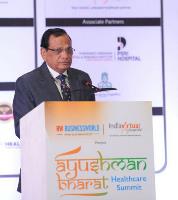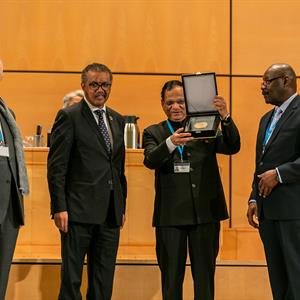When accepting his Award, Professor Vinod Paul shared a memorable moment in his life. Back in 1977, as a 22-year old intern studying medicine, he volunteered to help for a paediatric congress. He then met and shook hands with the most famous paediatrician of the time, a medical celebrity – Professor Ihsan Dogramaci from Turkey. "Little did I know," Professor Paul says, "that 40 years after I would have the privilege of receive a global award on the name of Dr Dogramaci. This is a moment I shall always cherish."
Clinician, educator, researcher and public health advocate Professor Paul is recognized for his lasting contribution to improve the health and well-being of families. He is one of the academics who worked to bring newborn health to the centre stage of the Millennium Development Goals. His was among the strongest voices to mobilize the global community for tackling neonatal deaths. The results were remarkable – 1.4 million less neonatal deaths occurred globally in 2016, as compared to 2000.
Professor Paul has worked across all levels – subnational, national, regional and global. Having introduced neonatal care in two of India’s states, he got to understand how to motivate policy makers to adopt new practices such as newborn resuscitation and kangaroo mother (skin-to-skin) care, and was instrumental to introduce newborn health in medical facilities.
 At national level, he is recognized as one of the leading public health experts of the country. He is a counsellor of the Prime Minister’s NITI Aayong think-tank, responsible for health, nutrition and education. There is hardly a national guideline, tool or policy relating to maternal, newborn and child health that does not bear his imprint. Besides, he is a renown academic and lecturer – his founding book on paediatrics is about to be republished soon for a 9th edition, and in India only, there are about 200 000 medical students who use it as their textbook for paediatrics at any given moment. He recently learned that it was translated in Chinese, too, and medical students were also using it as a core learning source.
At national level, he is recognized as one of the leading public health experts of the country. He is a counsellor of the Prime Minister’s NITI Aayong think-tank, responsible for health, nutrition and education. There is hardly a national guideline, tool or policy relating to maternal, newborn and child health that does not bear his imprint. Besides, he is a renown academic and lecturer – his founding book on paediatrics is about to be republished soon for a 9th edition, and in India only, there are about 200 000 medical students who use it as their textbook for paediatrics at any given moment. He recently learned that it was translated in Chinese, too, and medical students were also using it as a core learning source.
"India has just endorsed a flagship transformational initiative Ayushman Bharat, led by our Prime Minister, which will ensure that we show by doing what universal health coverage means, in practice," says Professor Paul. By 2022, the country has pledged to open 150 000 new health and wellness centre across the country, and introduce financial protection for low-income, poor and deprived population groups. This will cover almost 500 million people, making secondary or tertiary care hospitalization accessible for them. Each family in this category is entitled to a sum that would cover even complex interventions such as knee replacement or a heart bypass. "We are making a huge step towards UHC, setting the next generation of India’s health system."
He is equally well experienced in working across borders. As a Director for the WHO Collaborating Centre for Neonatal Health, he served on many scientific committees developing guidelines and of the teams setting up global strategies and action plans on maternal, newborn and child health. He led Indian support to the doctors, nurses and midwives in neighbouring countries, transferring knowledge and good practices, and ensuring they benefit from the best available knowledge in the field of neonatal health. At global level, he championed a focus on "solutions" as a member of the UN Secretary General’s Independent Accountability Panel on the Global Strategy on Women’s, Children’s and Adolescents’ health.
Professor Paul’s view on the functioning of health systems has been transformational. He was in the team crafting pragmatic, innovative health financing models that resulted in the creation of primary care and public health facilities ready for the future.
His expertise as well as passion for achieving universal health coverage is unprecedented. He has been a lead member of the High Level Expert Group on UHC since 2012, served as Co-Chair of the Global Partnership for Maternal, Newborn and Child Health and is among the world’s most influential experts in UHC and human resources for health.
When asked why he chose paediatrics, Professor Paul remembers the time when he was a student, and then later during his fellowship in Chicago. "I was looking to contribute for a wholesome discipline, one that would allow sophisticated innovate care to be integrated into ground levels, and be part of public health. At that time, nobody would even want to listen when we tried to explain the need for newborn and neonatal health." But he pursued to become one of the world’s most acclaimed experts in this area.
"It is holistic, with strong human touch, gives us doctors the possibility to respond to needs, it is the joy of teaching general practitioners and nurses how to take care of mothers and babies, it is all about the future of the nation. That’s what keeps me going down this road."

